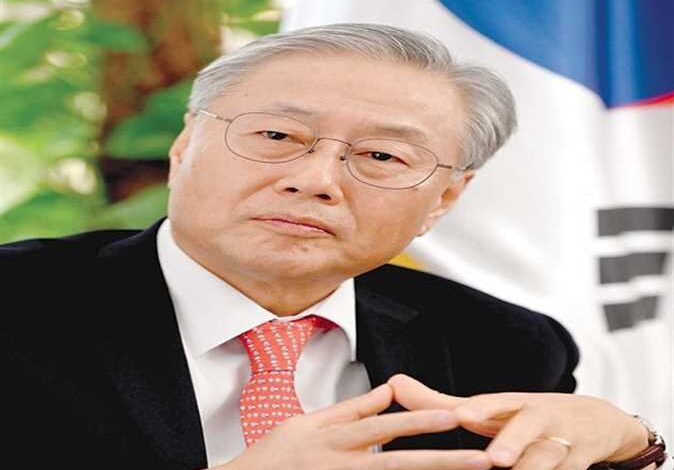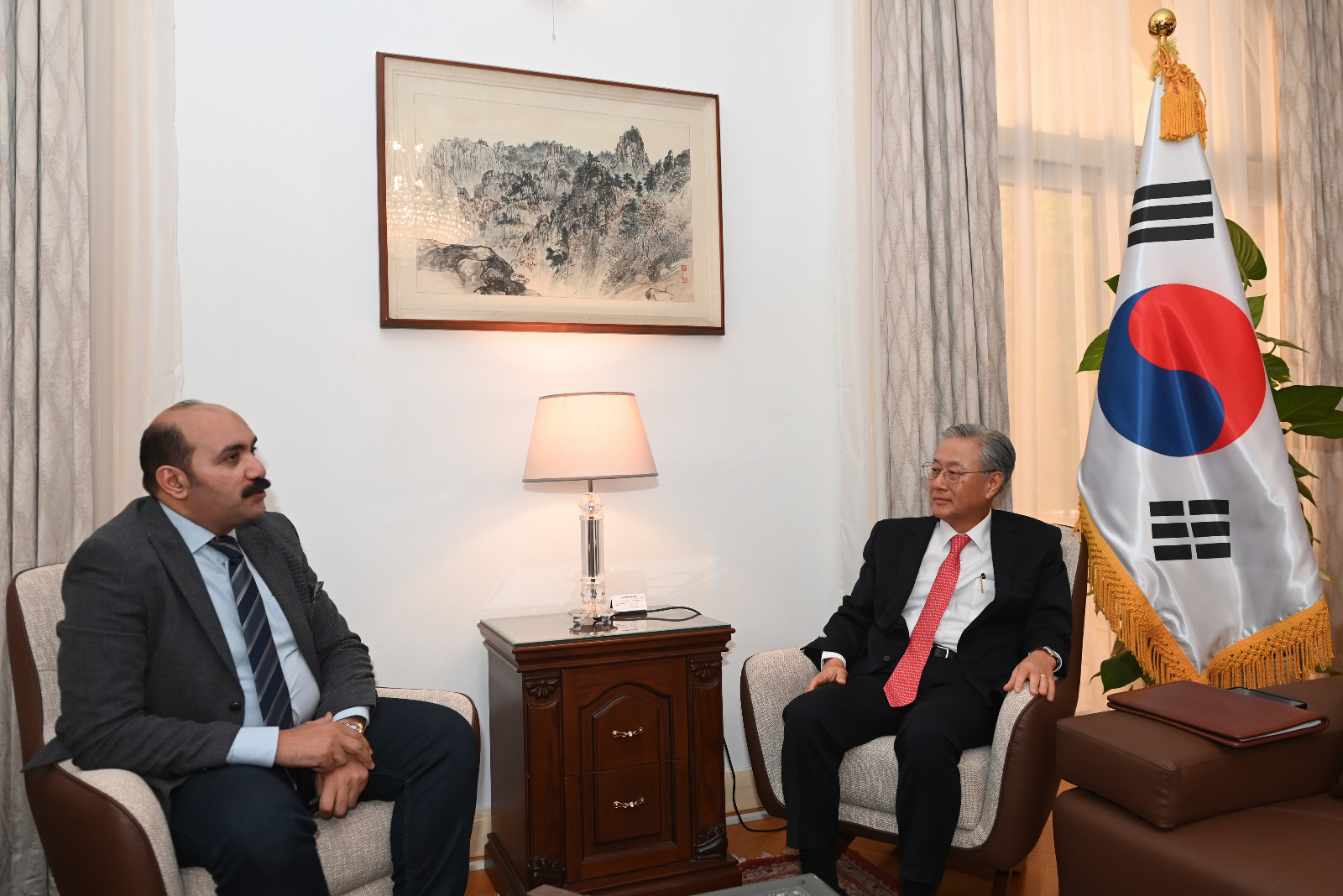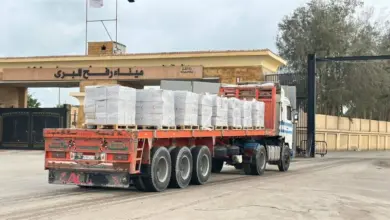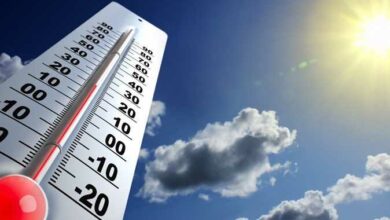
The Ambassador of the Republic of Korea to Cairo, Kim Yonghyon sat down for an exclusive interview with Al-Masry Al-Youm, where he discussed how this year marks the the 30th anniversary of relations being established with Egypt, regional tensions in the Middle East and the push for peace with North Korea.
How do you view the political and economic relations between Egypt and South Korea? You promote the “Made in Egypt” slogan for exports. What is the economic return for Cairo?
Since the establishment of diplomatic relations between Egypt and Korea in 1995, even though 30 years is a relatively short period relations in various fields—political, economic, cultural, and development cooperation—have witnessed radical and remarkable development.
Relations between the two countries rose to that of a Comprehensive Cooperative Partnership as an aftermath to President Abdel Fattah al-Sisi’s visit to Korea in 2016. President Moon Jae-in’s visit to Egypt in 2022 also provided an opportunity to enhance practical cooperation in various fields.
With President Lee Jae Myung taking office this June, there is renewed interest in strengthening relations with Egypt, and the Korean President’s Special Envoy, Park Beom Kye, the former Minister of Justice and a key figure in parliament is currently visiting Cairo.
His presence is expected to be a key facilitator of strengthening Egyptian-Korean relations.
A series of high-level bilateral consultations are scheduled to mark the 30th anniversary of the establishment of diplomatic relations. On the economic front, the volume of trade exchange in 2022 reached approximately US$3.16 billion, five times what it was when relations were established.
Korea’s total cumulative investments in Egypt have reached approximately $1 billion, and leading Korean technology companies are producing advanced products in Egypt under the label “Made in Egypt.”
The local production and export model adopted by Korean companies not only brings in foreign currency and creates job opportunities, but also contributes to Egypt’s rise as a regional manufacturing hub, thus effectively contributing to achieving Egypt’s Vision 2030 and advancing its economy.
Therefore, we decided to hold the Korean-Egyptian Economic Conference on September 30, as an opportunity to review the achievements of economic cooperation and anticipate future directions of cooperation.
Hyundai Rotem metro cars have also become a staple mode of transportation for Cairo residents, and Korea Hydro and Nuclear Power Corporation and Doosan Enerbility are participating in the Dabaa nuclear power plant project, playing a pivotal role in Egypt’s sustainable energy strategy.
Regarding cultural cooperation, the Korean Cultural Center plays a major role in this sector.
The Korea Week will kicks off in October with a diverse program featuring performances including Samulnori (Korean traditional percussion music performance) and the Taekwondo Demonstration by Kukkiwon (World Taekwondo Headquarters).
Are there new investments in the Suez Canal?
The Suez Canal is a key logistical hub for global maritime shipping traffic, as the Suez Canal Economic Zone has significant potential to boost industry and attract investment in Egypt.
Korean companies have taken an interest in this axis, and several projects are underway.
For example, an environmentally friendly infrastructure project is underway in the Suez Canal with support from the Korea Economic Development Cooperation Fund, and a joint project between Korean companies and Egyptian partner companies is underway to build a factory to produce electric railway cars for the second and third lines of the Cairo metro within the Suez Canal Economic Zone.
Egypt has tremendous potential in solar energy. What can Korea offer Egypt in this field?
Yes, that is true. Korea is globally competitive in manufacturing solar panels and energy storage systems, and has extensive experience in solar energy generation projects.
Therefore, combining Egypt’s abundant solar resources with Korea’s technical capabilities can contribute to achieving Egypt’s environmental transformation vision.
Russia is building the Dabaa nuclear power plant. What is Korea’s role in this project, and what is the difference between what Russia and Korea are offering?
Russian companies are acting as the main contractor to manage the Dabaa plant construction project, while Korean companies are responsible for a vital component of the plant’s construction: the secondary section known as the “turbine island.”
Korea possesses global expertise and technology in the nuclear reactor industry. It has proven its efficiency by successfully building a nuclear power plant in the middle of the desert in the United Arab Emirates, demonstrating its technical superiority.
Therefore, we are contributing to the successful construction of Dabaa, Egypt’s first nuclear power plant, as this will enhance energy security and ensure a stable electricity supply for Egypt.
What is South Korea’s role in supporting sustainable development projects in Egypt? What do future cooperation opportunities look like in technology transfer and expertise exchange, and what about cooperation in the green transformation?
South Korea has designated Egypt as a key partner for its official development assistance in the Middle East and North Africa region, focusing its support on in the areas of transportation, environment, energy, public administration, education, and communications.
Korea also contributes to supporting sustainable development in Egypt and achieving the goals of Vision 2030.
Egypt has shown interest in technology transfer from Korea.
Rolemodel projects in this regard include the Beni Suef Technological University and vocational training programs in electric vehicles. University-industrial cooperation is being implemented, including training programs within Samsung factories.
In addition, practical training programs are being implemented with Hyundai Rotem.
The Korean government also welcomes Egypt’s interest in the green transformation and its political inclusion, and supports this transformation through projects such as converting waste into resources in Cairo Governorate and replacing diesel-powered ships in the Suez Canal with LNG-powered vessels.
You recently met with the Minister of Education. What is the future of cooperation in the field of education?
My government intends to provide a total financial support of $15 million over five years, starting in 2027, to support the digital transformation in Egyptian education. Under this support, an infrastructure of computer rooms and internet networks will be established in 54 middle schools in 27 governorates.
Training will also be provided to enhance the skills of teachers and students in digital use.
As a pioneer in digital transformation in education, Korea hopes to contribute its experience and knowledge in this field. It is important to prepare future generations through regular curricula.
By cooperating in writing curricula, the two countries seek to enhance mutual understanding and spread a positive image of each other. Korean students already learn in textbooks about Egyptian civilization, its industrial structure, and the Suez Canal. Based on this, we hope that Egyptian students will be able to learn about Korean technology and innovative economy, along with Korean popular culture, Korean cuisine, and other aspects of the Korean wave of culture known as “Hallyu.”
We also feel the great interest among Egyptians in learning the Korean language.
We are working with the Ministry of Education to enable Egyptian students to study Korean as part of the regular curriculum. We aim to adopt Korean as one of the official second foreign language in Egypt. We will work to begin with pilot schools next year and gradually expand this. Please note that Korean students can study Arabic as part of the official curriculum, and Arabic is an option as a second foreign language in the university entrance exam.
The details and technical aspects of introducing Korean language instruction in Egyptian secondary schools are currently being reviewed. The plan includes launching a pilot program in two schools next year, gradually increasing the number of participating schools, and eventually adopting Korean as an official second language in the Egyptian education system.
Initially, it will be necessary to bring in Korean language teachers from Korea. We also plan to tap on Egyptian people who have studied Korean at Ain Shams University’s Faculty of Languages or other educational institutions as teachers.
How many Korean tourists have visited Egypt? What are your goals for the coming years? Have you prepared a program in your country in preparation for the opening of the Grand Egyptian Museum?
The number of Korean tourists has decreased due to the Corona pandemic, but has recently resumed its annual increase.
In 2024, approximately 42,000 Korean tourists visited Egypt, indicating an increase in the number of tourists.
The travel program to Egypt has traditionally focused on visiting famous historical landmarks such as the Pyramids of Giza and Luxor, and practicing water sports in the Red Sea.
Recently, however, travel programs on Korean television stations have featured diverse areas such as the Siwa Oasis, the Bahariya Oasis, Alexandria, and the Qaitbay Citadel, diversifying tourist destinations.
The embassy is working to create the conditions that will enable our citizens to visit more destinations.
Regarding the Grand Egyptian Museum, the embassy is closely following the opening ceremony scheduled for November 1. A famous Korean YouTuber with 2.95 million subscribers recently covered the news of the museum’s official opening, sparking great interest among Korean tourists planning to visit Egypt.
We are also working to restore the direct flight route, which operated for several years prior to 2011 and the subsequent COVID-19 pandemic. However, we expect it to return soon, which will positively benefit both countries and stimulate tourism and the economy.
Promoting cultural exchange between Egypt and South Korea is a broad concept. Is it limited to holding concerts and teaching languages? Are there programs for cooperation in joint theatrical projects or translating dramas?
Cultural exchange is an excellent way to understand each other and bridge gaps. Therefore, our embassy works on implementing diverse programs, including artistic performances and exhibitions. Experimental programs, film screenings, and Korean language instruction through the Sejong Institutes.
We view cultural exchange not as a one-way street, but rather as a two-way interaction in which the cultures of two countries blend, generating mutual understanding and empathy. Therefore, we actively work on projects involving participants from both countries.
In the cinema sector, as part of the 2023 Korean Film Festival, Korean film directors visited the Egyptian Media Production City to discuss ways to cooperate in co-production.
In 2024, we held a co-production workshop dedicated to young filmmakers. In the field of literature, and in light of the writer Han Kang winning the Nobel Prize, events were made available to Egyptian translators who translated Korean works into Arabic.
They will participate in lectures sharing their experiences, lessons, and expertise in translating Korean into Arabic.
We also plan to continue expanding human exchanges between artists from both countries to enhance opportunities for achieving tangible results in areas such as translating literary works and co-producing TV series and films, among others.
Korean President Moon Jae-in has previously visited Egypt. Is there a schedule for President Lee Jae Myung’s visit to Cairo?
Following President Sisi’s visit to Korea in March 2016, President Moon Jae-in visited Egypt in January 2022. I accompanied him as his diplomatic secretary. I am pleased to contribute to strengthening practical cooperation between the two countries in various fields. With the Lee Jae Myung government taking office on June 4 of this year, I expect the two leaders to communicate through visits such as the presidential delegation’s visit to Egypt this week.
What is your view of Egypt’s role in stopping the war in Gaza?
The Republic of Korea appreciates Egypt’s role in the Gaza issue, and we see it making multiple diplomatic efforts to maintain regional peace and stability amid the complexities prevailing in the Middle East.
South Korea attaches great importance to the stability of the Middle East and achieving peace there.
We express our concern about the escalation of regional tensions as a result of the recent attacks in Doha, in addition to the deteriorating situation in the Gaza Strip.
My government has provided $70 million in humanitarian aid since the outbreak of the crisis in October 2023 until now.
We hope that an immediate ceasefire will lead to the release of the hostages and an improvement in the humanitarian situation.
As a responsible middle power and a non-permanent member of the Security Council this year, my government will continue to actively participate in the international community’s efforts to resolve these crises. I hope for an end to the war on the Gaza Strip.
This is my country’s position, especially in light of the horrible situations Gaza is experiencing due to the cessation of aid.
Therefore, there is a need to release the hostages, rebuild, and rebuild the country.
The Asia-Pacific Economic Cooperation (APEC) summit is scheduled to be held next month. How do you see its impact on Korea, especially in light of US tariff policies?
Korea has been an active member since the bloc’s founding, and the leaders’ summit in Korea, to be hosted 20 years after 2005, is significant.
Korea expects the APEC summit to be an important opportunity to expand regional cooperation based on key themes. These include stimulating trade and investment, promoting digital innovation, and achieving sustainable and inclusive growth.
Regarding US tariff policies, Korea and the US have reached an agreement on reciprocal tariffs, and we believe that detailed consultations will continue successfully.
Do Muslims in Korea enjoy freedom of worship, and how many are there currently? Is there any cooperation with Al-Azhar scholars?
Under Article 20 of the Korean Constitution, all citizens enjoy freedom of religion. Therefore, Muslims have the legal right to practice their religion freely. The number of Muslims in Korea is estimated at approximately 260,000, and there are approximately 20 mosques to facilitate their religious practice.
Some universities, airports, and other public institutions also provide facilities for worship. In December 2023, I met with Grand Imam Ahmed al-Tayeb to discuss ways of cooperation between the two countries.
I would like to emphasize my pride in Al-Azhar’s status as a prominent spiritual and educational center for the Islamic faith. Given the high scientific standing of its scholars, and based on this conviction, I called for strengthening exchange and solidarity between the youth of Korea and Egypt.
Imam Al-Tayeb expressed his hope that the diverse cooperation between the two countries would contribute to deepening mutual political understanding. We will continue to strive to enhance understanding and solidarity between the two countries through cooperation with Al-Azhar scholars.
And work to empower more Koreans to understand the Islamic values of coexistence, tolerance, and giving.
South Korean President Lee Jae Myung calls for peace with North Korea, while Pyongyang considers these calls false and insincere. What is your vision for the relationship between the two countries?
Our country, through President Lee Jae Myung, desires peace with North Korea, considering that we are originally one nation, one culture, and one language.
History has proven that war will not bring benefits.
Therefore, we are keen to extend our hands in peace and we have never missed an opportunity to seek North Korea’s response to our call for negotiations with us and the United States of America. We know it takes time, but the meetings between the South Korean and American presidents highlight the importance of negotiation and achieving peace on the Korean Peninsula.
Unfortunately, confrontation between the two Koreas has escalated in recent years. Since President Lee’s inauguration last June, my government has made efforts to ease military tensions and engage in more serious dialogue with the North to establish lasting peace on the Korean Peninsula. So far, the North has not responded positively, which might be unsurprising.
In my opinion, lasting peace, peaceful coexistence, and mutual respect are essential conditions that pave the way for dialogue and exchange. My new government is committed to this direction. I hope the North will respond in the near future.
Korea seeks to end the Cold War on the Korean Peninsula and fulfill its responsibility and role in contributing to global peace and stability. We look forward to the full support of Egypt, both the government and the people, in achieving peace on the Korean Peninsula.





